My Speech to the IEA & ASI's Freedom Week 2025
I was honoured to be invited to speak at Freedom Week 2025, discussing practical politics as a free marketeer.
Practical Politics as a Free Marketeer
Rt Hon Steve Baker FRSA
Introduction: From Theory to the Leaflet
I am a classical liberal of the Austrian school—firmly a minarchist, perhaps even anarcho-capitalist at times. Milei is open about his anarcho-capitalist ideals, and I share many of those instincts. It’s a rare position these days, and not always easy to advocate.
But as my agent put it, “You can’t write ‘no taxes and no services’ on a leaflet and expect to be elected.” Practical politics demands moderation, accessibility, and relevance. Translating ideological purity into effective policy—and into something the public can rally behind—is a challenge.
But times might be changing—Labour are giving us an object lesson in how not to govern, and the electorate may be more willing to listen than ever.
The Twin Crises: Fiscal and Political
We face two converging storms:
1. Fiscal Crisis is No Longer Distant
The UK’s fiscal troubles were once a slow-moving train, always a medium-to-long-term worry. Labour today have managed to bring it to our doorstep. Government spending exceeds even the wildest estimate of sustainable taxation. Consequences—higher taxes, reduced growth, declining services—are now an imminent threat to our prosperity and social stability.
2. The Reorientation of Politics away from Economic Organisation
Traditional political battles were drawn between capitalism and socialism, free markets and statism. Now, the central axis of politics is shifting: it’s communitarian nationalism vs. internationalist globalism—the “somewheres” versus the “nowheres.” We see this in Reform’s surge in Britain, AFD’s momentum in East Germany, and the identity politics that fuel Trump’s base in America.
This focus on identity and belonging, powerful as it is, has come at the worst possible time: just as fiscal and economic realities demand serious, principled reform.
And then, layered on top: war. Classical liberals believe in a strong defence, but abhor war; yet today, wars are being fought by or between nuclear powers. In this fragile context, we must advocate for peace and free trade as our route to prosperity—and stay relevant.
Principle and Pragmatism: The Classical Liberal Approach
Relevance Means Meeting People Where They Are
What, then, is the role of a classical liberal free marketeer? Your first task is to make yourself relevant.
Theory alone doesn’t win votes. We must speak to the public’s actual concerns and lived realities.Talk to people where they are—not where you wish they’d be. A purist free market position (“abolish the welfare state!”) isn’t just unelectable: it’s problematic. Millions rely on the state, particularly pensioners who simply can’t go back to work. Whatever should have happened, we need answers now.
The Moral Dimension
True classical liberalism is rooted in the principle “do no harm.” If an individual isn’t harming others, the state has no moral right to interfere.
However: moral purity must coexist with pragmatic governance. We must protect liberty while securing a floor of support for the most vulnerable, whatever their circumstances.
Applying Economic Wisdom and Free Market Principles
Mises: Human Action and Market Logic
Ludwig von Mises built his system on a simple axiom: "Man acts"—we consciously pursue goals using available means. From this flows everything: market prices emerge from individual value judgments, not bureaucratic formulas. When government intervenes through price controls or monetary manipulation, it distorts these crucial signals, creating boom-bust cycles and economic chaos.
The beauty is both rigorous and humble: we don't claim to know what outcomes markets will produce, only that voluntary exchange coordinates human action better than coercion.
Hayek: Spontaneous Order
Friedrich Hayek showed us that complex systems—markets, languages, legal traditions—arise organically through human interaction, not central design. No planner coordinates global trade, yet resources flow to their most valued uses through price signals.
But as Hayek warned in The Road to Serfdom, comprehensive economic planning doesn't just fail economically—it leads toward authoritarianism. Central planners lack the dispersed knowledge of millions of individuals, so they must increasingly coerce those who resist their plans.
Government's role is setting the framework—property rights, rule of law—within which voluntary cooperation flourishes, not directing specific outcomes.
Hazlitt's One Lesson
Henry Hazlitt gave us the practical test: good economics looks beyond immediate effects to long-term consequences for all groups. Rent control helps current tenants but shrinks housing supply. Minimum wages raise some incomes but price others out of jobs. Tariffs protect specific industries but harm consumers and overall efficiency.
Every intervention has vocal beneficiaries and silent victims. Classical liberals speak for the unseen.
The Moral Core
Our fundamental insight: it is wrong to coerce people doing no harm to others. If someone's actions harm only themselves or involve voluntary agreements, what right have we to stop them? You may disapprove—and should be free to say so politely—but coercion requires justification.
Experience: Theory Meets Parliamentary Practice
I’ve led big parliamentary rebellions—to uphold that democratic power can be dismissed at the ballot box, to oppose unnecessary COVID lockdowns, to champion abundant energy and real freedom instead of rigid Net Zero policies. These are classical liberal campaigns, even if the European Union, for instance, offers market freedoms. For me, democracy weighs more.
These were classical liberal causes, but my experience has shown the limits of backbench insurgency. Particularly, as I would say to all of you, I think I personally have tested to destruction the extent to which the UK can be governed by backbench rebellions.
Ministerial collective responsibility and party loyalty are often deeply frustrating for any MP committed to principle, especially when personal convictions clash with the party line or government policy. Yet these conventions remain vital: they ensure governments speak and act with one voice, uphold democratic accountability, and prevent decision-making descending into chaotic fragmentation. While it's tempting to rebel on grounds of conscience, lasting progress requires teamwork and the unity that enables a government to deliver coherent and stable policy. The challenge is balancing loyalty with integrity—knowing when to stand firm alone, and when to work collectively for practical change.
The UK cannot be governed through endless rebellion, however principled. You may admire the fight, but the only route forward is to form a government with both a sound and practical policy program—and then win a public mandate and deliver it.
Choosing a Political Home—and Making it Better
Practical politics means choosing a party infrastructure, however imperfect:
Liberal Democrats? I’m sceptical.
Labour, under Blair, did take pro-market steps in health and education.
Reform? Many policies are statist, even nationalising.
Conservatives? Perhaps the best hope.
Choose the party you find least repellent—then work to infuse it with real classical liberalism. You’ll make it better by your presence.
And don’t stop there: collaborate constructively with classical liberals in other parties. We must make common cause where we can, setting aside tribal differences for the greater good.
How We Relate to People Matters
Even when we don’t agree, how we relate matters. The lasting lesson is written in Dale Carnegie’s “How to Win Friends and Influence People”, which should be required reading for all involved in public life.
Criticizing and condemning rarely wins allies.
Better to appreciate, engage, and guide people—especially those who don’t agree with you.
Closing: The Path Forward for Free Marketeers
Practical politics means compromise.
Remain unashamed of your principles, but avoid pursuing dogmatism at the cost of practical political success.
Make classical liberalism relevant by showing tolerance, offering dignity, and building coalitions inside your chosen party and across parliamentary lines.
Always strive to elevate debate—be respectful, be constructive, and above all, be persistent.
Politics is a people business. Ideas—no matter how sound—reach their potential only when delivered with civility and practical relevance. That is the true vocation of the free marketeer in British politics.
In order to face the immense challenges before us, free marketeers must effectively translate the wisdom of theory into effective policy.
How do you think you can be a practical free marketeer in contemporary British politics? Please do let me know in the comments below.


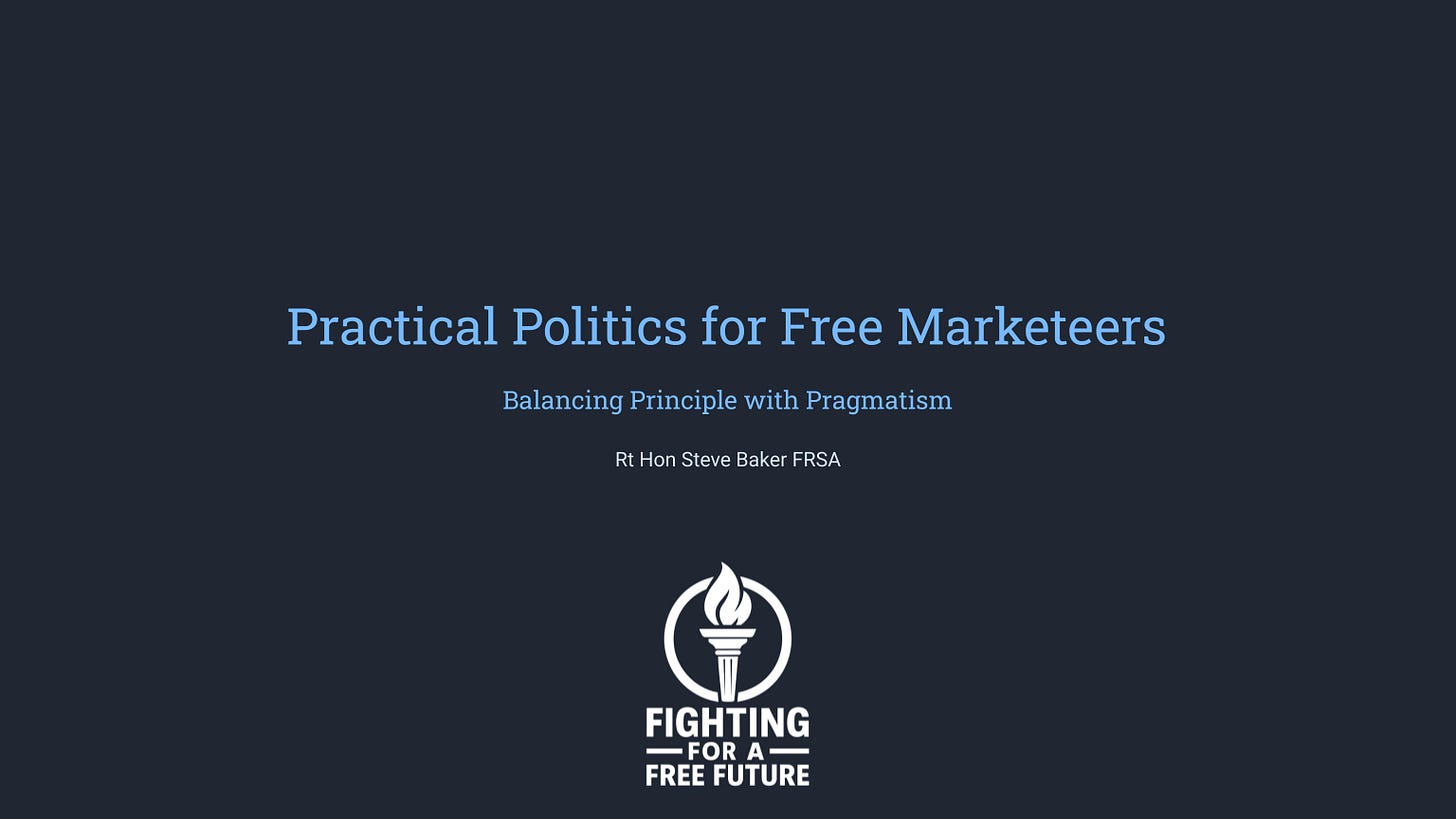
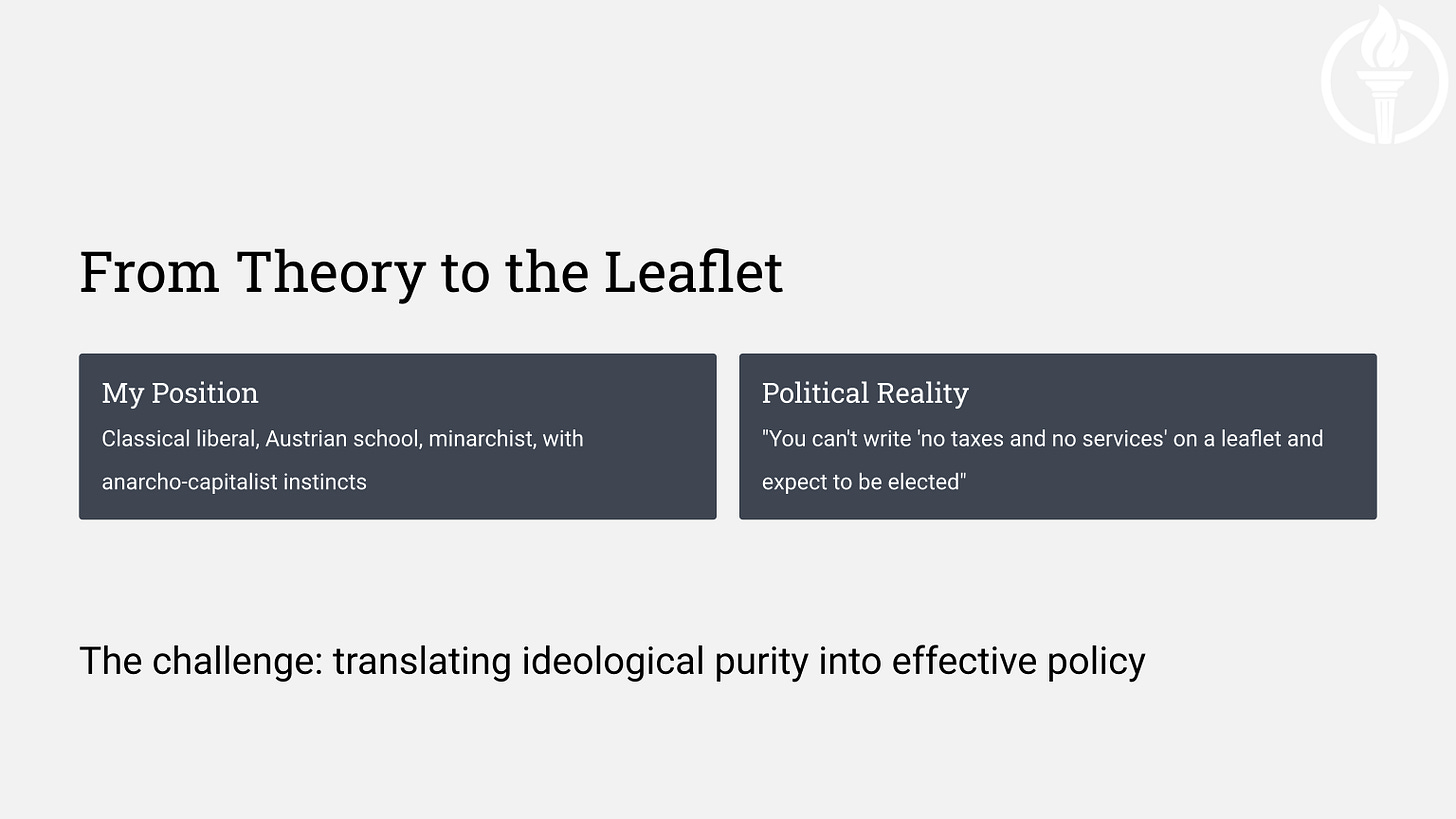
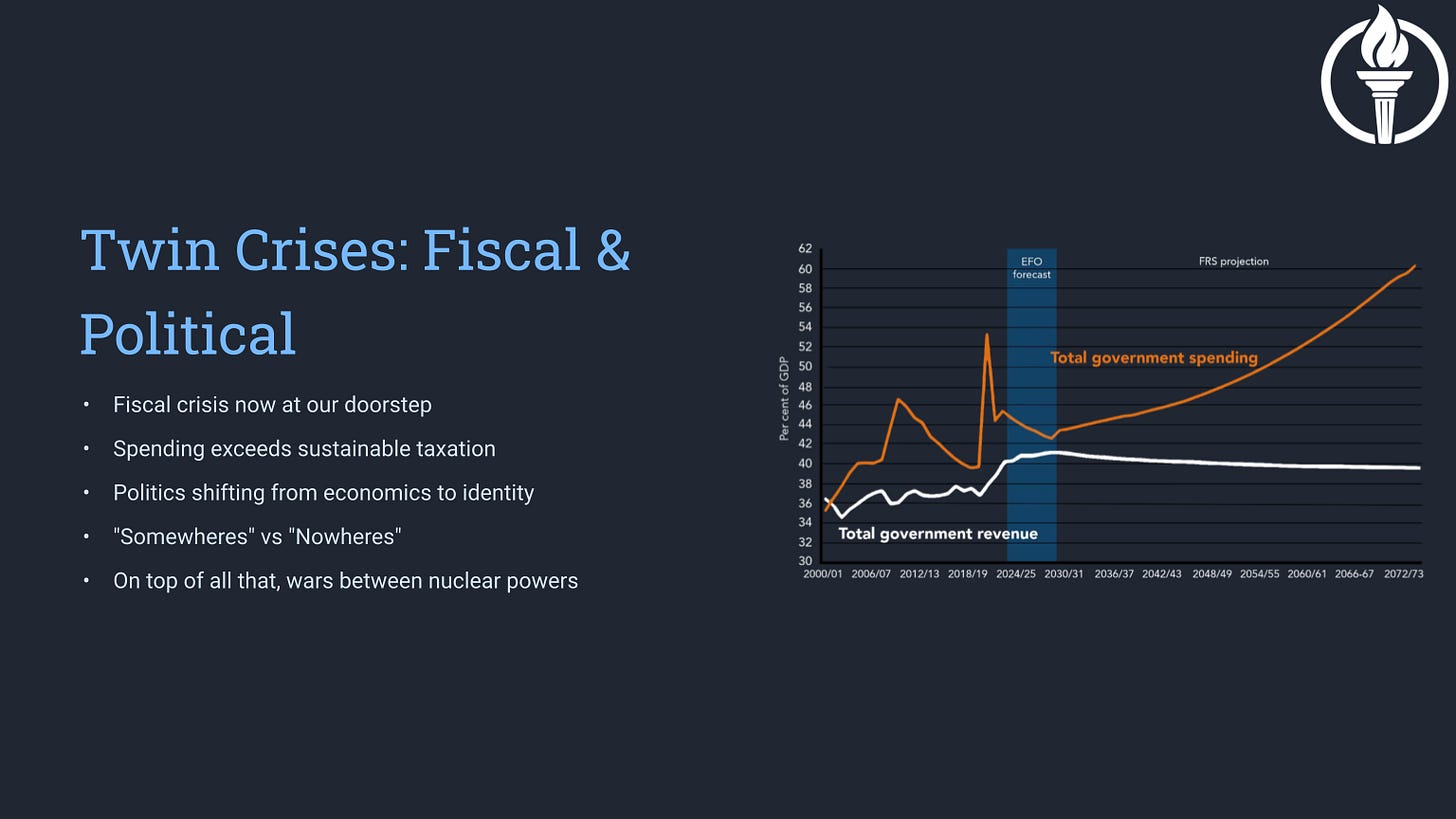
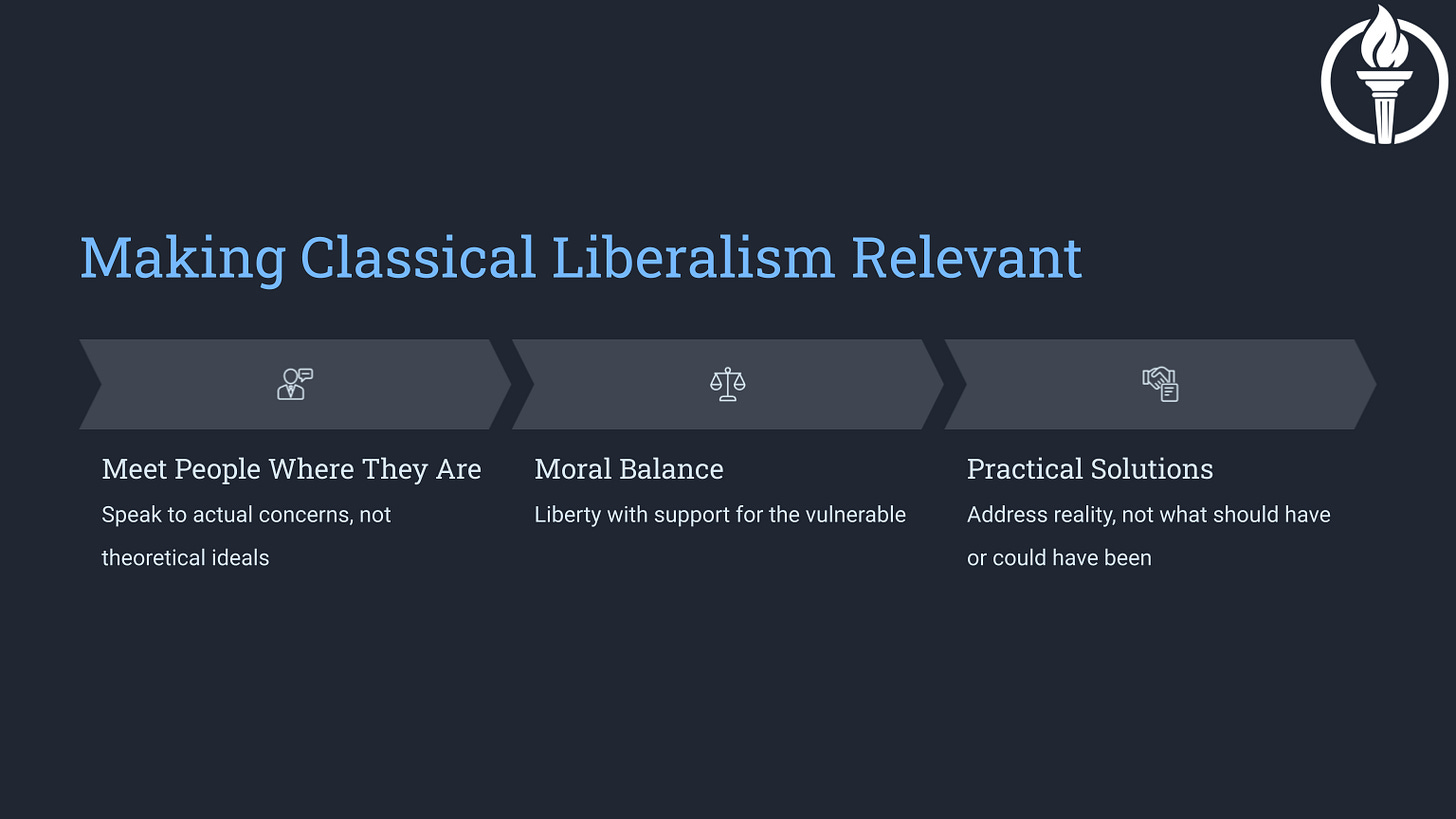

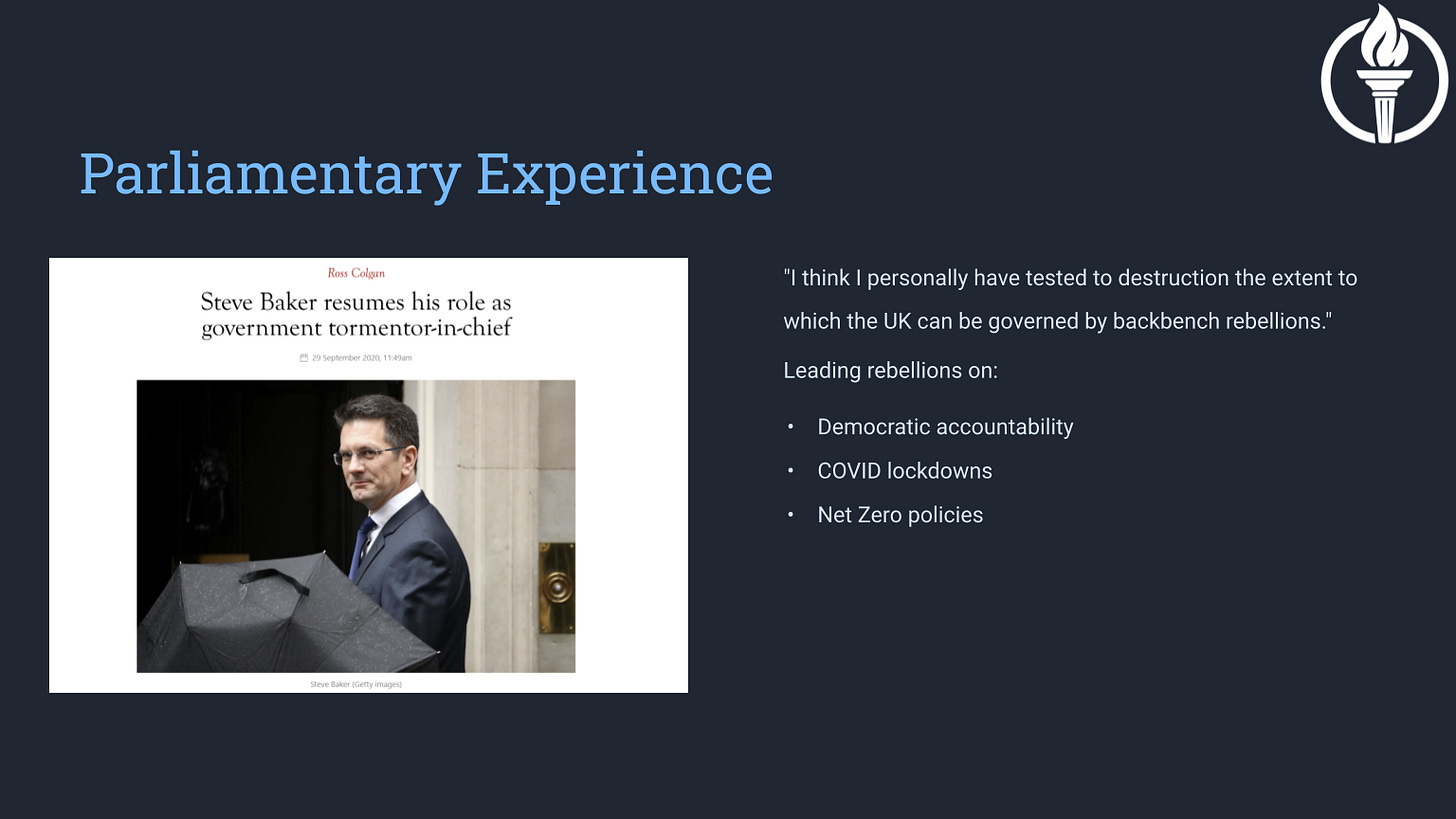
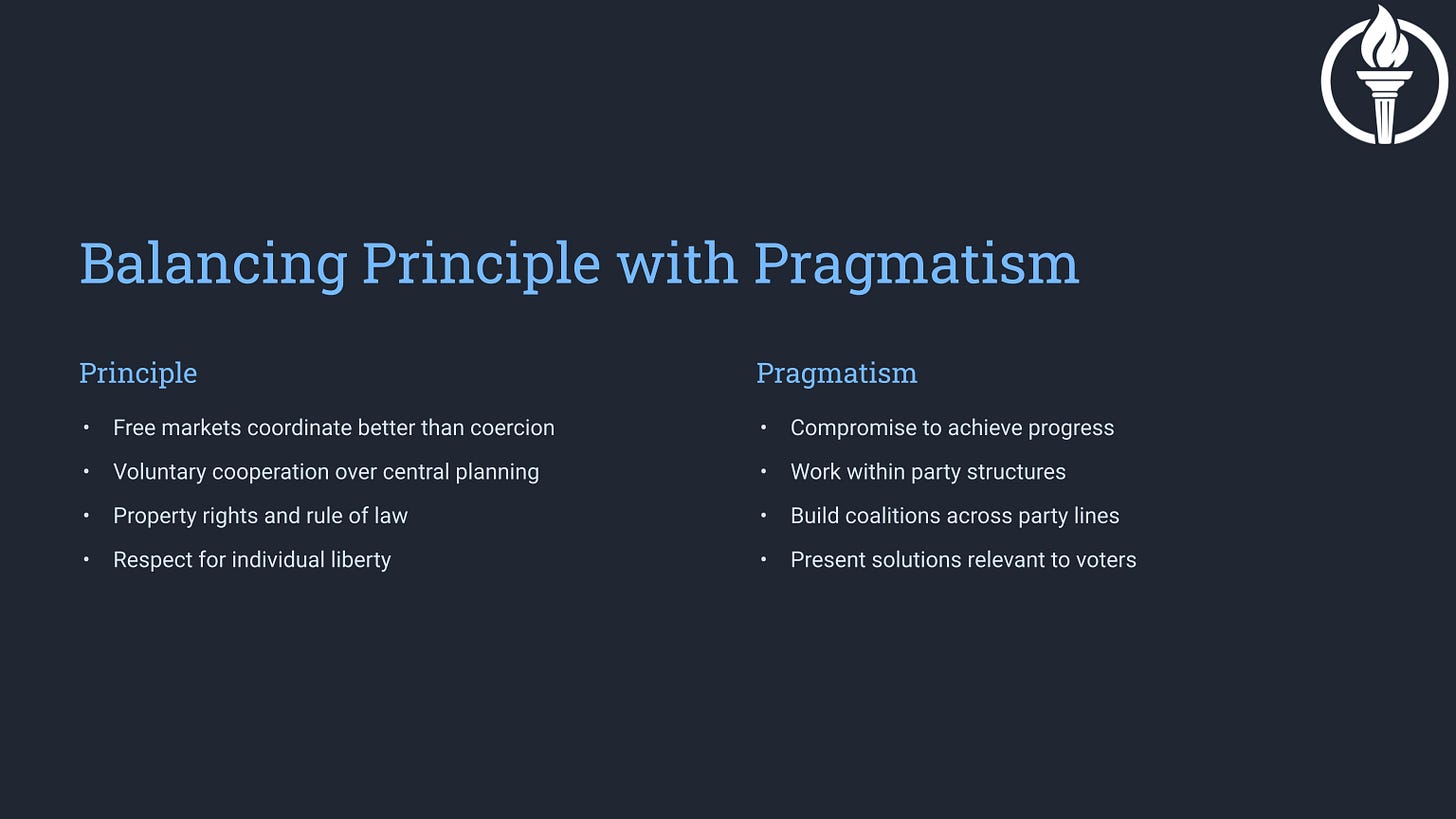
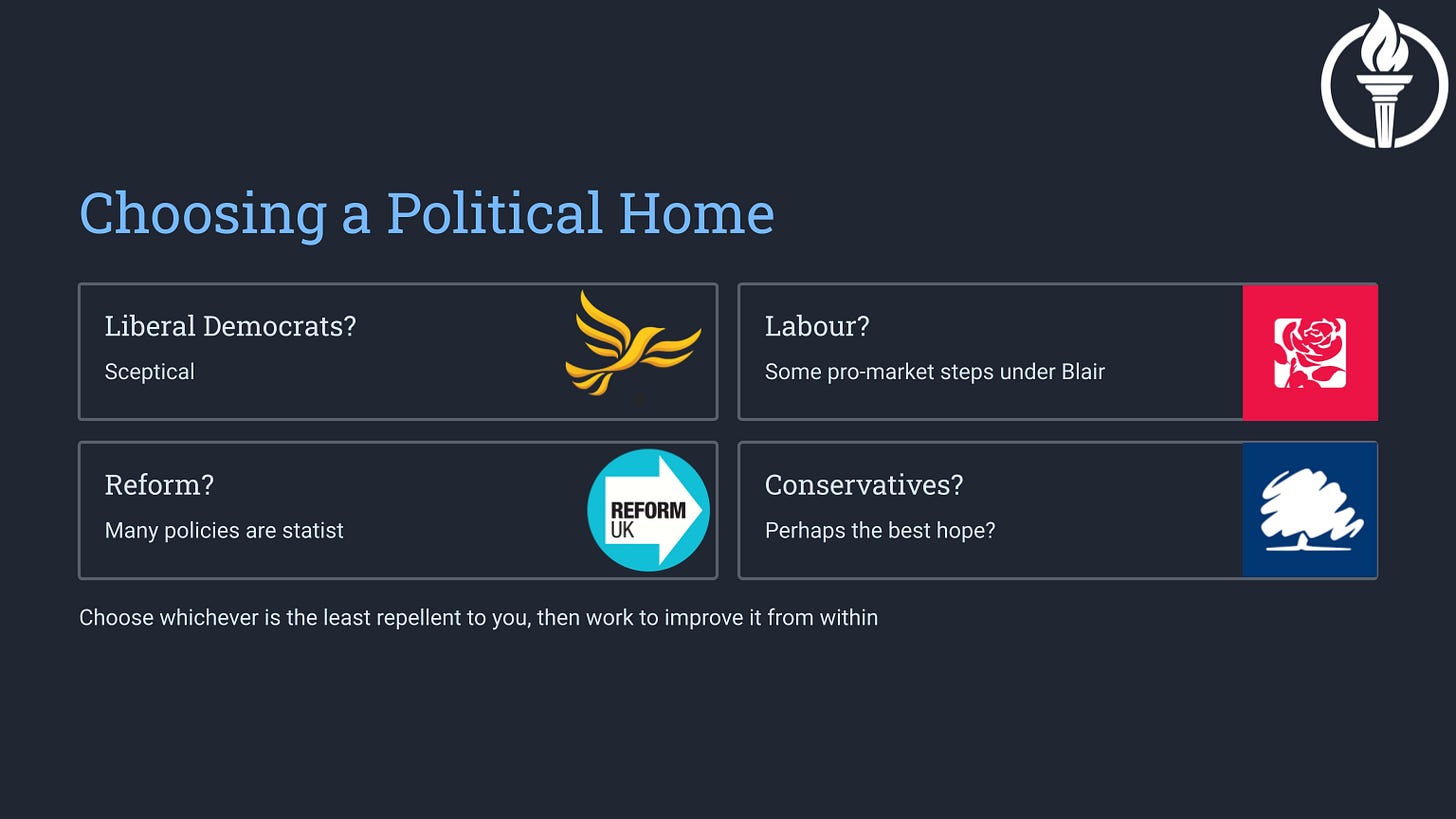
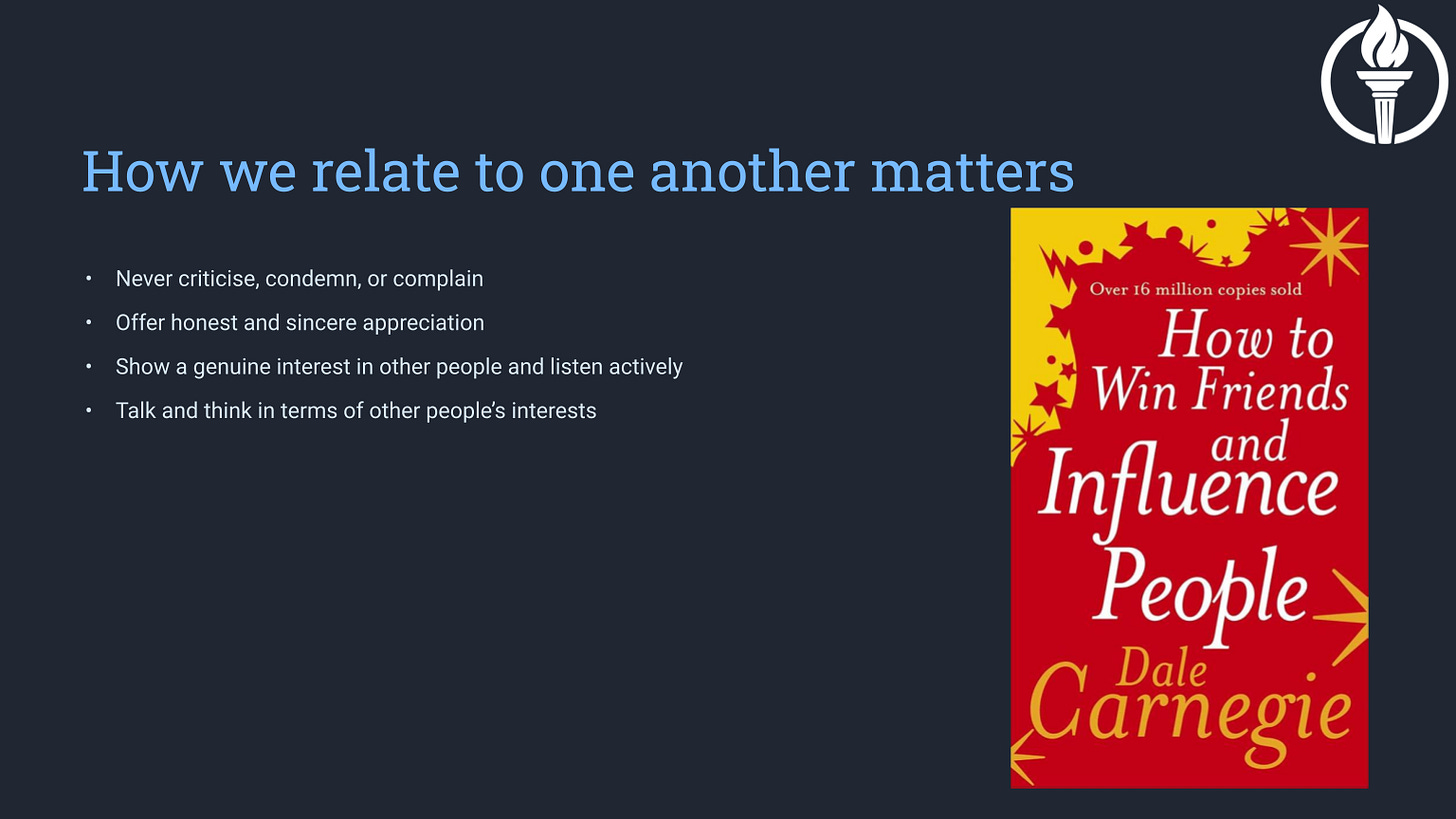
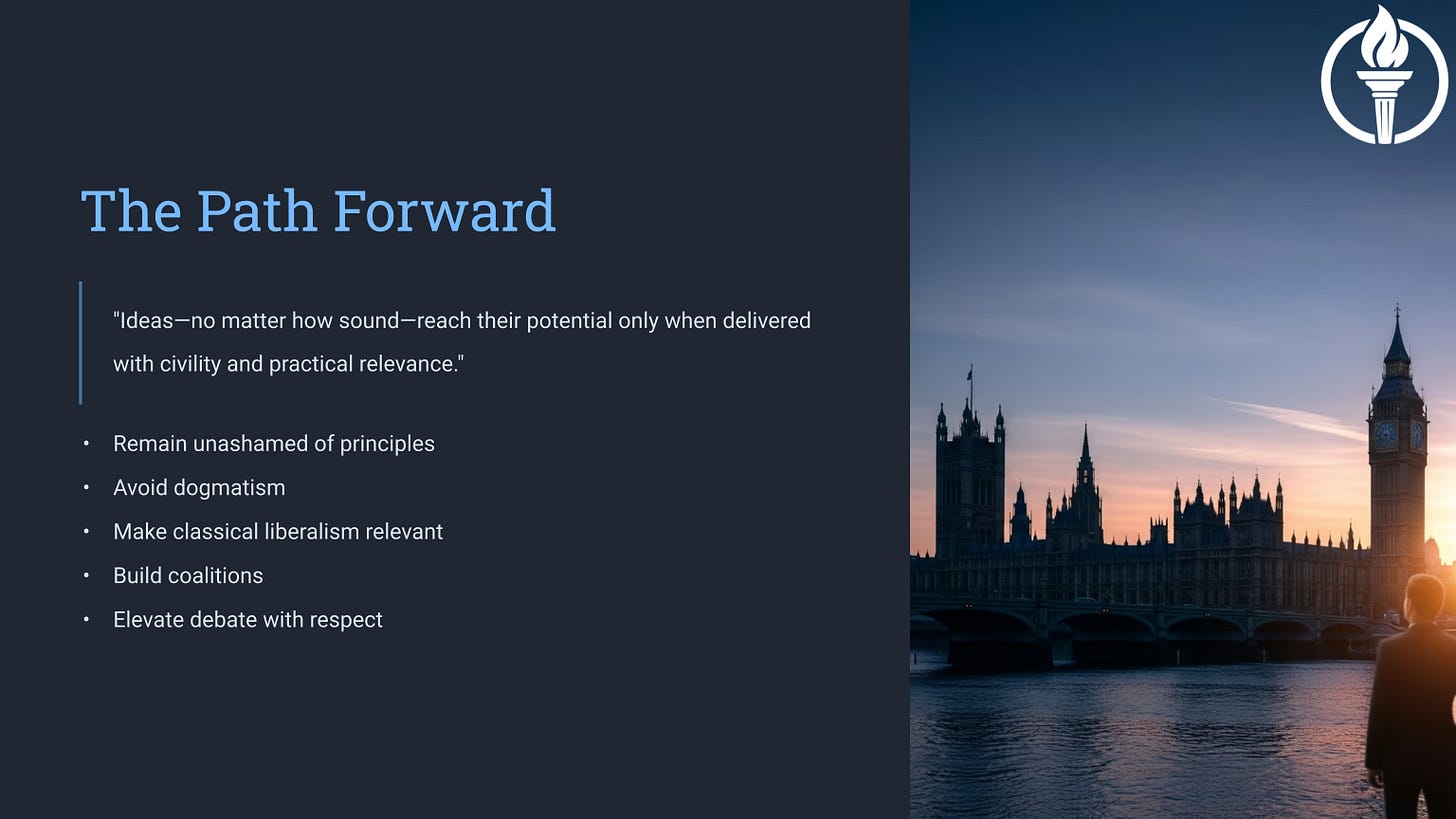

Thanks Steve. The Classical Liberal argument well stated here, and grounded in reality. Interesting how it's not necessarily a politically right-wing philosophy and can live within different political parties, depending on one's attitude to the care of the vulnerable. To be fair as an argument, how does this 'take' deal with embedded intergenerational disadvantage? (eg land-owning families' children and inheritances vs the children of poor or immigrants), which can fuel an argument for 'systemic injustice or systemic racism'?.